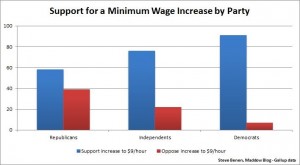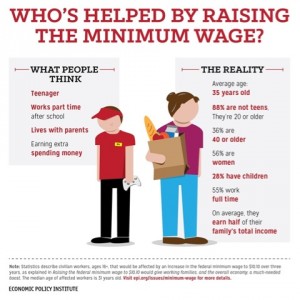A Blocked Senate Vote on Minimum Wage, A Moral Call to Action Against Poverty Wages
I learned a lot from my experience with hunger, lessons I wish more of our Senators understood before making their frustrating decision not to vote for an increase in the minimum wage this week, blocking a vote on the Minimum Wage Fairness Act.
Don’t get me wrong. I have been one of those fortunate in the security of knowing when and where my next meal will come from. But three times during the past few years, I have challenged myself to live, at least partially, the experience of the millions of food insecure children, adults, and seniors by eating a week’s worth of meals on the average food stamp allotment: $31.50 the last two times, $21 the first time (quite a difference). During those difficult weeks I was joined by dozens of rabbis, cantors, interfaith leaders, regular people, Jewish and non-Jewish, and members of Congress in taking the Food Stamp Challenge to raise awareness about the need to protect programs like SNAP, the Supplemental Nutrition Assistance Program, previously known as food stamps.
Taking this challenge opened my eyes in unexpected ways. I was surprised by the exhaustion I felt, and the lack of creativity as my mind focused on my next unsatisfying meal. While these feelings only lasted a week for me, they are daily experiences for the families who a raise in the minimum wage would help most.
But that help is sadly not coming. Not today, at least, and not from this Congress. Unless we act.
Our Responsibility: Moral & Absolute
Our responsibility for helping the poor is moral and absolute. In Judaism, we have a particular emphasis on the needs of our workers. Much of the Talmud is dedicated to the relationship between a worker and her employer, covering wages, hours, even the right to quit. We are taught in Deuteronomy 24:14 that we must pay a worker their wages promptly. Why? Because “he is needy and urgently depends on it.” The rabbis knew that work is essential as each of us depends on our wages. The best way out of poverty is a job. In fact, Maimonides considered it the highest form of tzedakah to give somebody a job, and with it, the means to take care of themselves.
Yet many of our country’s workers are still denied that opportunity because of low wages. A full-time worker making the minimum wage will earn about $15,000 a year, hardly enough to take care of oneself, let alone a family. And these are not just teenagers living at home. About half of minimum wage workers are at least 25, and one in 13 has a college degree. Had the Senate voted to approve the wage increase, these workers would earn enough to keep a family of three above the poverty line. It also would have been the first raise for tipped workers since 1991.
The Fight Is Not Over
Instead, we have stuck to the status quo of historically low wages. The fight is not over though. We can, and must, do more to lay the groundwork for a future minimum wage increase that gives our workers the dignity and opportunity they deserve. The first step, as always, is making sure our Representatives and Senators hear from us. Call their offices, write a letter, tell them your story, and let them know that you support a minimum wage as the right thing to do morally and economically.
Pushing Change Forward In Our Communities
There are also ways we can impact change on the community level. Many of our cities and states are poised to take up a minimum wage increase that can make a real difference. These officials need to hear from you too. We should appeal directly to businesses as well, asking them to pay their workers a minimum wage of $10.10 – and supporting those that do. But wages are only a part of the picture of economic justice in our country. A salary increase will mean little if a worker is denied access to affordable housing or health care. A lack of either of which could bring financial ruin for a family at a moment’s notice. And without an increase, we will continue to need SNAP benefits, which are being diminished by the Congress. A worker’s nutrition needs do not change in relation to salary. Rather, low-wage workers are just faced with fewer options. Yet while Congress resists efforts to raise pay, they also vote to restrict access to SNAP, despite the program’s proven success at lifting 47 million out of poverty in 2011 alone.
The faith community, in particular, has an important role to play in shaping this discussion. As part of our Food Stamp Challenge, we encouraged rabbis to speak to their congregations about the prevalence of hunger in each of our communities. This Passover, we teamed up once again with MAZON: A Jewish Response to Hunger for hunger seders in the US Capitol and around the country that tied the holiday’s message of freedom to the ongoing problem of hunger. Through Fighting Poverty with Faith, which we have co-chaired with Catholic Charities, the interfaith community has united for six years to make ending poverty a national priority.
Economic Fairness: A Primary Religious Concern
Economic fairness is a primary religious concern. From creation, when each of us was created in the image of the divine, to the requirement that we leave parts of our fields for the poor, our teachings are replete with the lesson that all should have an equal opportunity to lead a happy and meaningful life with dignity. A vote to raise the minimum wage is just one way we could have opened our hands to the needy among us. The Senate’s vote to block consideration of that bill is a sore disappointment, but as long as economic deprivation persists, so will our diverse efforts to end it.
Rabbi Steve Gutow is a rabbi, lawyer, community activist, and Jewish leader. He currently serves as the President and CEO of the Jewish Council for Public Affairs. Steve has been named to the Forward 50 and in 2009 and 2010, Newsweek named him the 20th most influential rabbi in the US. He served as chair of the Save Darfur Coalition, and was the founding executive director of the National Jewish Democratic Council. Steve graduated from the Reconstructionist Rabbinical College and served as Adjunct Law Professor Law at St. Louis University.
![[the current issue of ZEEK]](../../image/2/100/0/5/uploads/leftistethicistgraphic-52842c6a.png)
- 5000 Pages of Zeek
- Founded in 2001, Zeek was the first Jewish online magazine, and we have over 5000 pages online to prove it, all available free of charge. Read more in the Archive.
More articles by
Rabbi Steve Gutow
More articles in



